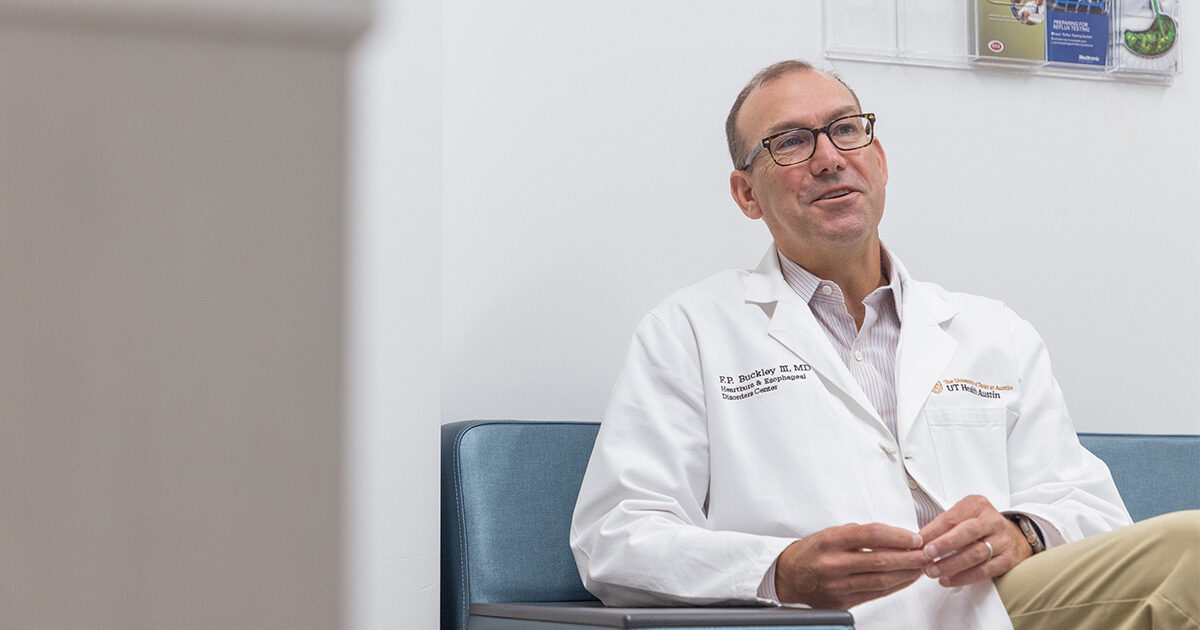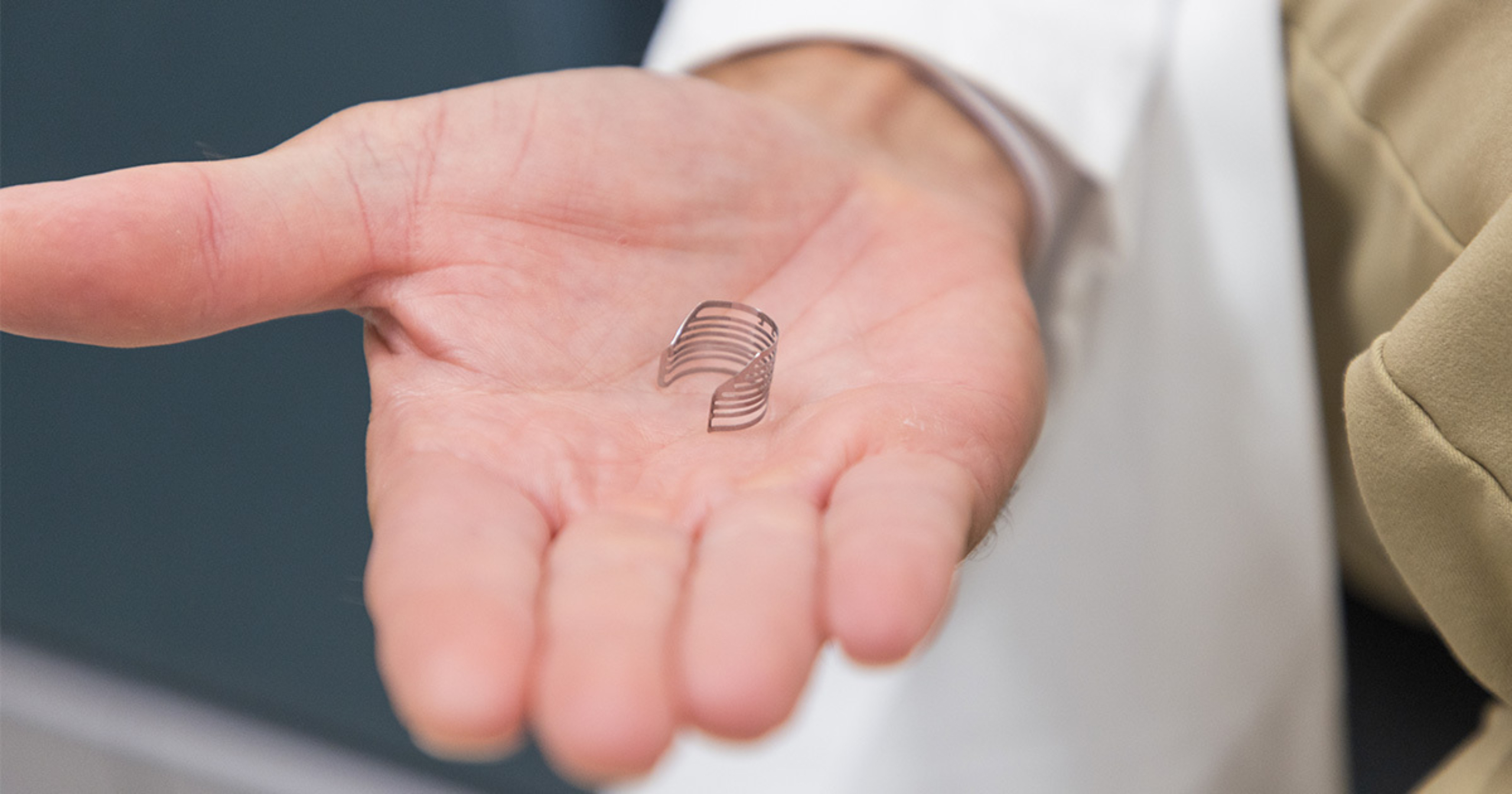Digestive Health Kicks Off Clinical Trial With World-First Procedure
New treatment may offer a more efficient path to gastroesophageal reflux disease relief
Reviewed by: F. P. “Tripp” Buckley III, MD, FACS
Written by: Lauren Schneider

On August 18, 2023, a new anti-reflux surgical procedure was performed for the first time in history by UT Health Austin board-certified surgeon F. P. “Tripp” Buckley III, MD, FACS, who serves as the Surgical Director of Digestive Health, a clinical partnership between Ascension Seton and UT Health Austin. The surgery was performed as part of a research study evaluating the Omega PF™, a new device developed to treat gastroesophageal reflux disease (GERD).
“By my estimation, there are 14 million people walking around the United States alone who would benefit from anti-reflux surgery based on the American College of Gastroenterology guidelines,” shares Dr. Buckley. “This device could expand the treatment options available to this population, furthering our team’s goal to make excellent outcomes in anti-reflux surgery possible for everyone.”
The five-year study of the Omega device at Digestive Health will be helmed by Dr. Buckley and board-certified surgeon Elisa Furay, MD, who serves as the the Medical Director of the Heartburn and Esophageal Disorders specialty within Digestive Health.
A Simpler Alternative to Traditional Reflux Surgery
Manufactured by Aplos Medical, the Omega device is a small, flexible cuff that wraps most of the way around the lower esophagus to support the lower esophageal sphincter, which forms the barrier between the esophagus and the stomach. “In GERD, dysfunction of the lower esophageal sphincter allows acidic contents of the stomach to pass into the esophagus, causing symptoms of discomfort,” explains Dr. Buckley.
The current gold standard for anti-reflux surgery in the United States is a procedure known as Nissen fundoplication in which the lower esophageal sphincter is reinforced by wrapping tissue from the upper part of the stomach around the lower esophagus to prevent stomach acid from traveling into the esophagus.
“Nissen fundoplication is associated with excellent surgical outcomes when performed by an experienced surgeon, but the Omega device promises a quicker and easier procedure for surgeons, decreasing the likelihood of complications and side-effects,” notes Dr. Buckley. “While the Omega device is not the first anti-reflux implant developed as an alternative to Nissen fundoplication, it is simpler in function than other devices currently available.”
Other anti-reflux implants on the market can also present challenges for patients undergoing magnetic resonance imaging (MRI). Due to the metal content of these devices, patients can only be scanned by 1.5T MRI machines. The Omega device is made from the same titanium alloy as cardiac stents and has been provisionally approved for use in 3T MRI scanners, the highest magnetic strength typically used in a medical setting.

An Opportunity for GERD Patients With Stubborn Symptoms
Tyler Cronin, a 37-year-old veteran of the United States Coast Guard and Army National Guard who currently studies at Texas A&M University in College Station, was the first patient to receive the Omega device. Prior to this procedure, Tyler experienced painful symptoms that were not alleviated by proton-pump inhibitors, the standard medication used to treat acid reflux.
Learn more about Tyler’s GERD treatment journey.
<br>In addition to seeking pain relief, Tyler chose to take part in the research study to help improve care for other reflux patients. “I knew that if my experience could pave the way for a new treatment option for patients with GERD, then my participation in the trial would be worth it,” shares Tyler.
Dr. Buckley encourages patients similar to Tyler to consider enrolling in the research study. “People who suffer from reflux disease and experience breakthrough symptoms, such as heartburn and regurgitation, despite taking medication, are good candidates for the research study,” says Dr. Buckley.
A Step Forward for Evidence-Based Reflux Care
This small research study marks the first phase of the Omega device’s path from the laboratory to the market. Before it can become commercially available, the device will need to undergo the sort of large, multicenter clinical trial required for approval by the Food and Drug Administration (FDA). For now, the Omega device is only being studied at one other site, the Keck School of Medicine of the University of Southern California.
“Digestive Health was approached to study the device at such an early stage in the research process because of our high volume of anti-reflux procedures performed at our clinic, with over 400 procedures performed each year, and the clinic’s relationship with the Dell Medical School at The University of Texas at Austin,” explains Dr. Buckley. “Alongside our excellent surgeons, as an academic medical center we have the research infrastructure and personnel to support us in these clinical trials,” shares Dr. Buckley.
The Heartburn and Esophageal Disorders care team is involved in various research projects, including an ongoing multicenter clinical trial comparing laparoscopic Nissen fundoplication (LNF) to a procedure known as transoral incisionless fundoplication (TIF) for GERD patients who also have a hiatal hernia. This clinical trial is expected to continue through the end of 2023.
“Anti-reflux surgery is one of the most underutilized surgical procedures due to variable outcomes,” notes Dr. Buckley. “Through innovation, training, and research we can bring consistently excellent surgical outcomes to the many millions of patients currently suffering from GERD despite medical therapy.”
“The Omega device could address issues in GERD treatment that exist not just for our patients but for patients worldwide,” continues Dr. Buckley. “My goal is to make an impact on our community and the world at large by helping develop new techniques and training new surgeons.”
For more information or to schedule an appointment with Digestive Health, call 1-844-GI-AUSTIN (1-844-442-8784) or visit here.